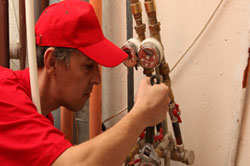Plumbing has become one of the careers of choice lately, as surveys and statistics regarding the future of the profession indicate. The following article will help individuals who are not familiar with the plumbing job description to get an idea on the responsibilities, duties and requirements in order to make an educated decision. While the demand for plumbers is growing fast due to the infrastructural developments, the salaries are powerful incentives, even at entry level, and the job related stress is relatively low. However, it is advisable to review the high and low points of this profession beforehand.
The scope of the plumber
It is necessary to point out that plumbers do not work alone, but rather in conjunction with other specialists in order to ensure the positive outcome of the project. The overview of their attributes include, servicing, installing and repairing all the components of a plumbing system, as well as the associated fixtures and appliances.
Depending on the client, the plumber may either work in a residential building, a commercial one, an industrial complex or a public building. The installation of new fixtures or the replacement of new pipes is done in accordance with the blueprints depicting the existing system, or the ones designed by the plumber based on the architectural specifications. Moreover, the pipelines they service or install can transport:
- Water
- Waste
- High or low pressure liquids
- Gases
Plumbing job description: Primary responsibilities
The three primary types of categories that integrate the responsibilities of a plumber are as follows:
- Actual installation, maintenance and repair procedures
- Keeping the structure up to standards (functionally and legally)
- Administrative tasks
For the actual plumbing procedures, the worker will need to be able to read and comprehend plans and blueprints of the structure he needs to service, and determine the necessary materials or utensils that the job requires. At the same time, the same thing goes for any special equipment. Furthermore, before inserting new pipelines, the plumber will need to evaluate whether the structure can support them or whether additional hangers are required. Once all the fixtures, valves or pipelines have been correctly installed, the last step involves thorough functionality verification in order to eliminate leakage or other potential problems.
Given that plumbing systems require maintenance at preset dates, the job of the plumber is to make sure he adheres to deadlines for checkups and other procedures. For this task, he will need to verify alignments, pipe grades, manufacturer specifications regarding usage and installation, and so on. Moreover, his report should state whether the plumbing system respects environmental protection standards. As far as the administrative tasks are concerned, they include budgets, ordering the necessary supplies, filing reports, and so on.
The attributes needed
The plumber must show extensive knowledge of the aforementioned tasks, which will be acquired during apprenticeship or vocational school training. Verbal abilities and the effective communication with the rest of the team members is also essential, given that plumbing is rarely a solo project. At the same time, working under physically and sensory demanding conditions are part of the plumbing job description too.

- Home
- Jobs In Plumbing Information
- Entry Level Plumbing Jobs
- How To Bid A Plumbing Job
- Job Search Plumbing
- Jobs In Plumbing Qualifications
- Plumber Job Openings
- Plumbing Contract Work
- Plumbing Employment Agencies
- Plumbing Job Description
- Plumbing Jobs Agencies
- Plumbing Jobs Rates
- Plumbing Jobs Recruitment
- Plumbing Jobs Training
- Plumbing Jobs Websites
- Jobs In Plumbing USA
- Types Of Jobs In Plumbing
